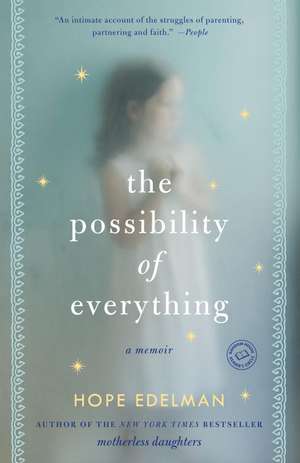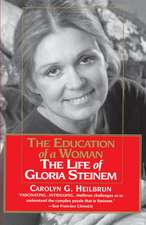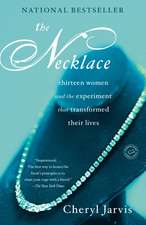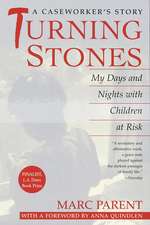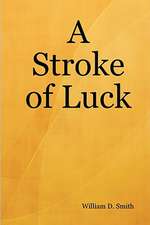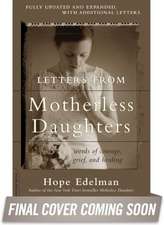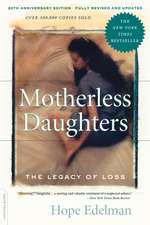The Possibility of Everything
Autor Hope Edelmanen Limba Engleză Paperback – 31 iul 2010
Vezi toate premiile Carte premiată
Books for a Better Life (2009)
Look for the discussion guide inside
In the autumn of 2000, Hope Edelman was a woman adrift, questioning her marriage, her profession, and her place in the larger world. Feeling vulnerable and isolated, she was primed for change. The Possibility of Everything is the story of the change that found her. A chronicle of her extraordinary leap of faith, it begins when her three-year-old daughter, Maya, starts exhibiting unusual and disruptive behavior. Confused and worried, Edelman and her husband make an unorthodox decision: They take Maya to Belize, suspending disbelief and chasing the promise of an alternative cure. This deeply affecting, beautifully written memoir of a family’s emotional journey and a mother’s intense love explores what Edelman and her husband went looking for in the jungle and what they ultimately discovered—as parents, as spouses, and as ordinary people—about the things that possess and destroy, or that can heal us all.
Preț: 113.56 lei
Nou
Puncte Express: 170
Preț estimativ în valută:
21.73€ • 22.61$ • 17.94£
21.73€ • 22.61$ • 17.94£
Carte disponibilă
Livrare economică 25 martie-08 aprilie
Preluare comenzi: 021 569.72.76
Specificații
ISBN-13: 9780345506511
ISBN-10: 0345506510
Pagini: 342
Dimensiuni: 135 x 203 x 21 mm
Greutate: 0.27 kg
Editura: BALLANTINE BOOKS
ISBN-10: 0345506510
Pagini: 342
Dimensiuni: 135 x 203 x 21 mm
Greutate: 0.27 kg
Editura: BALLANTINE BOOKS
Notă biografică
Hope Edelman is the author of five nonfiction books, including the bestsellers Motherless Daughters and Motherless Mothers. A graduate of the University of Iowa’s Nonfiction Writing Program, she has published articles, essays, and reviews in numerous magazines and anthologies. She lives in Topanga, California, with her husband and two daughters.
From the Hardcover edition.
From the Hardcover edition.
Extras
Chapter One
Topanga Canyon, California
September 2000
The soft clinks of a metal spoon against stainless steel filter upstairs from the kitchen as Carmen prepares Maya's dinner. Tonight it's pasta with red sauce and a side dish of peas. Carmen hums as she cooks, low thrumming vibrations occasionally broken by a string of high- pitched la- la- la- las. I glance at the digital clock at the bottom of my computer screen. Five twenty-six P.M. In four minutes, I'll go down to sit with Maya for dinner, and relieve Carmen for the evening. Then I'll give Maya her bath and read her The Red Balloon, for the fourth time this week. I'll put her to sleep, watch some TV, get into bed with a book, and wait for Uzi to come home.
The ceiling fan churns above my head in determined, repetitive circles. I pinch the fabric of my white cotton tank top away from my chest and angle an exhale between my breasts, trying to dry the thin film of sweat that's settled there. It's late September in southern California, our hottest month of the year, and heat rises precipitously in a house with a wall of windows downstairs.
I move my fingers across the keyboard faster, as if the speed of my fingers might stir up a breeze. Today I'm working on a dual review for the Chicago Tribune, two Jewish- themed books that have little in common beyond the religious angle. Whoever paired them probably didn't realize that, and it's my job to figure out how to make them work together in the same review. The first book is a history of New York's Lower East Side, packed with detail and research. The second is a memoir by an American psychotherapist, a single mother who moved to Jerusalem with her school- age daughter to jump- start a new phase of her life. I felt predisposed to like this one, as the American wife of an Israeli- born husband, but each time the mother wrote about putting her rapturous love for her adopted country ahead of her daughter's well- being, I had to force myself to keep reading. As a reviewer I'm supposed to be objective and keep my focus on the text, but I've had to work hard at that with this one. As a mother I found too many times in the book when I wanted to grab the author by the shoulders and shout, "Snap out of it! And put your daughter on a plane back to the United States!" I'm trying to figure out if my reaction reveals a weakness in the book or if it's just a reflection of my parenting and the different choices I imagine I'd make. I know how much sweat and lost sleep goes into every book that's written, and I'm loath to review one harshly until I'm certain my criticism is valid.
Downstairs, Carmen sets Maya's sectional plate and sippy cup on the dining table, the sound of plastic kissing wood. Then there's the scuff of a wooden chair being dragged back across the red tile floor.
"La Ma- ya!" Carmen sings out. "It is time for dinner now, please!" I'm still not used to this, having someone else take charge in our kitchen. For the first few weeks after Carmen came to work for us four days a week, we kept circling each other awkwardly at the refrigerator at breakfast, bumping elbows in front of the sink at dinnertime, unsure of who should be doing what and when. Before I moved in with Uzi I'd lived alone for ten years, and I'd developed a highly particular way of getting things done. This is not to say I'm tidy or organized by nature— sadly, I am not— but I've always maintained a semblance of order in the kitchen. It's the singular achievement that gives me a sense of domestic competence, as if being able to find the cutting board in the same place every time I need it offers proof that no matter what kind of sorry state the living room might be in at that moment, I do know how to manage a household, after all. Now, whenever I find the bread knife lying in the silverware drawer instead of poking out of its designated slot in the wooden knife block or see leftovers stored in glass bowls covered with plastic wrap instead of locked into the Tupperware containers I've been using since college, I feel a surge of disoriented panic, as if I've somehow been rendered unnecessary in my own home.
Uzi says I struggle with this because I have trouble relinquishing control. I don't entirely disagree, but I think it's more that I have trouble giving up responsibility. For Maya's first two years, while Uzi was pulling ninety- hour weeks launching a dot- com start- up, I did all the evening shifts at home alone. I was the one who mashed Maya's peas with the blue whale fork, cut her chicken into bite- size cubes, and wiped ketchup smears from her chin with a damp paper towel. Before I went back to teaching and Carmen moved in to help, I was the one who scraped the dinner residue off all the plates, sponged down the table, and refrigerated the leftovers. In the Tupperware I've had since college. Isn't that what mothers are supposed to do?
"La Ma- ya!" Carmen sings again, slightly louder this time.
"Where is La Ma- ya?"
I press the "save" icon on my computer. Where is Maya? Probably in her room, getting into costume. Yesterday she was Snow White. The day before, a black- and- gray bat.
"Maya," I call out. "Carmen is looking for you."
God, it's hot in this room. I pluck my tank top away from my chest and let it snap back again a couple of times, just for the tiny rush of air under my chin. I reach down to shut off the computer— and there's a sudden blur of red and purple to my left and a blunt, painful collision of bone against bone on my left thigh.
"Ow!" I cry out, instinctively.
She's gone as quickly as she was upon me. I press the heel of my left hand hard into my leg. The pain echoes harshly, then fades into a dull ache. I can tell I'll have a bruise tomorrow.
"You hit me!" I say loud enough for Maya to hear, rising from the desk. "Maya!"
"Maya?" Carmen calls from the bottom of the stairs, her voice sounding a lot less certain now.
I find Maya in her bedroom, backed into the corner between her nightstand and the mirrored closet door. She's wearing a red-andpurple gypsy dress with a gold- coin sash, a hand- me- down from my college roommate's daughter. She holds her hands pinned tightly behind her back, an edgy Esmeralda, all pent- up energy and tension and doubt.
She thrusts her chin at me defiantly, as if she's expecting punishment, and that softens me a little. I'm not a mean mother. At least I don't want to be a mean mother. Or the kind of mother prone to frustrated, spontaneous outbursts, which, more and more frequently these past few months, I seem to have become.
Stay calm, I tell myself. Remember. To breathe.
I sit on top of the Pooh comforter stretched across Maya's double bed and fold my hands in my lap.
"So," I say. "Do you want to tell Mom what that was about?"
She uncoils in a rush. "It. Wasn't. Me!" she shouts, pounding her clenched little fists against her thighs to emphasize each word. When she does this, I see four fists pumping up and down, her two real ones and the two reflected in the mirror. It's like watching Maya and her angry, identical twin throwing perfectly synchronized tantrums.
"What do you mean, it wasn't you? I was sitting there and you ran in and hit me. I saw you."
"Mommy," she wails, and her face crumples into a pinched- up wad.
"It wasn't me! It was Dodo!"
"It was who?"
She rushes at me, and I rear back a little, anticipating another hit.
But this time she hurls her arms around my knees and clings to them.
"I didn't want to," she sobs. "Dodo made me."
"Who's Dodo?" The kid has an imagination the size of Guam, but I've never heard mention of a Dodo before.
"He's just . . . Dodo!" She smashes her face into my leg. The cries erupt from her in jagged little sobs.
"It's okay," I tell her, rubbing the back of her head. "I'm not hurt.
Shh. It's okay." I stare at the image of us in her closet- door mirror, the sobbing child and the mother with her dark eyebrows knit into the cartoon symbol for "confused." Maya can be stubborn and difficult to manage, but she's never been physically aggressive before, especially not toward an adult. She hit me with the intent to hurt: there was no ambiguity there. I'm already thinking about whether to tell Uzi about this later and, if I do, how to avoid putting a worrisome spin on it. The last thing he needs right now is hyperbole or drama from me, and the last thing I need tonight is hearing about how hard it is to live with someone who thrives on hyperbole and drama, like me.
Carmen's voice sails up to us from the bottom of the stairs.
"La Ma- ya," she calls. "The dinner is waiting for you now."
From the Hardcover edition.
Topanga Canyon, California
September 2000
The soft clinks of a metal spoon against stainless steel filter upstairs from the kitchen as Carmen prepares Maya's dinner. Tonight it's pasta with red sauce and a side dish of peas. Carmen hums as she cooks, low thrumming vibrations occasionally broken by a string of high- pitched la- la- la- las. I glance at the digital clock at the bottom of my computer screen. Five twenty-six P.M. In four minutes, I'll go down to sit with Maya for dinner, and relieve Carmen for the evening. Then I'll give Maya her bath and read her The Red Balloon, for the fourth time this week. I'll put her to sleep, watch some TV, get into bed with a book, and wait for Uzi to come home.
The ceiling fan churns above my head in determined, repetitive circles. I pinch the fabric of my white cotton tank top away from my chest and angle an exhale between my breasts, trying to dry the thin film of sweat that's settled there. It's late September in southern California, our hottest month of the year, and heat rises precipitously in a house with a wall of windows downstairs.
I move my fingers across the keyboard faster, as if the speed of my fingers might stir up a breeze. Today I'm working on a dual review for the Chicago Tribune, two Jewish- themed books that have little in common beyond the religious angle. Whoever paired them probably didn't realize that, and it's my job to figure out how to make them work together in the same review. The first book is a history of New York's Lower East Side, packed with detail and research. The second is a memoir by an American psychotherapist, a single mother who moved to Jerusalem with her school- age daughter to jump- start a new phase of her life. I felt predisposed to like this one, as the American wife of an Israeli- born husband, but each time the mother wrote about putting her rapturous love for her adopted country ahead of her daughter's well- being, I had to force myself to keep reading. As a reviewer I'm supposed to be objective and keep my focus on the text, but I've had to work hard at that with this one. As a mother I found too many times in the book when I wanted to grab the author by the shoulders and shout, "Snap out of it! And put your daughter on a plane back to the United States!" I'm trying to figure out if my reaction reveals a weakness in the book or if it's just a reflection of my parenting and the different choices I imagine I'd make. I know how much sweat and lost sleep goes into every book that's written, and I'm loath to review one harshly until I'm certain my criticism is valid.
Downstairs, Carmen sets Maya's sectional plate and sippy cup on the dining table, the sound of plastic kissing wood. Then there's the scuff of a wooden chair being dragged back across the red tile floor.
"La Ma- ya!" Carmen sings out. "It is time for dinner now, please!" I'm still not used to this, having someone else take charge in our kitchen. For the first few weeks after Carmen came to work for us four days a week, we kept circling each other awkwardly at the refrigerator at breakfast, bumping elbows in front of the sink at dinnertime, unsure of who should be doing what and when. Before I moved in with Uzi I'd lived alone for ten years, and I'd developed a highly particular way of getting things done. This is not to say I'm tidy or organized by nature— sadly, I am not— but I've always maintained a semblance of order in the kitchen. It's the singular achievement that gives me a sense of domestic competence, as if being able to find the cutting board in the same place every time I need it offers proof that no matter what kind of sorry state the living room might be in at that moment, I do know how to manage a household, after all. Now, whenever I find the bread knife lying in the silverware drawer instead of poking out of its designated slot in the wooden knife block or see leftovers stored in glass bowls covered with plastic wrap instead of locked into the Tupperware containers I've been using since college, I feel a surge of disoriented panic, as if I've somehow been rendered unnecessary in my own home.
Uzi says I struggle with this because I have trouble relinquishing control. I don't entirely disagree, but I think it's more that I have trouble giving up responsibility. For Maya's first two years, while Uzi was pulling ninety- hour weeks launching a dot- com start- up, I did all the evening shifts at home alone. I was the one who mashed Maya's peas with the blue whale fork, cut her chicken into bite- size cubes, and wiped ketchup smears from her chin with a damp paper towel. Before I went back to teaching and Carmen moved in to help, I was the one who scraped the dinner residue off all the plates, sponged down the table, and refrigerated the leftovers. In the Tupperware I've had since college. Isn't that what mothers are supposed to do?
"La Ma- ya!" Carmen sings again, slightly louder this time.
"Where is La Ma- ya?"
I press the "save" icon on my computer. Where is Maya? Probably in her room, getting into costume. Yesterday she was Snow White. The day before, a black- and- gray bat.
"Maya," I call out. "Carmen is looking for you."
God, it's hot in this room. I pluck my tank top away from my chest and let it snap back again a couple of times, just for the tiny rush of air under my chin. I reach down to shut off the computer— and there's a sudden blur of red and purple to my left and a blunt, painful collision of bone against bone on my left thigh.
"Ow!" I cry out, instinctively.
She's gone as quickly as she was upon me. I press the heel of my left hand hard into my leg. The pain echoes harshly, then fades into a dull ache. I can tell I'll have a bruise tomorrow.
"You hit me!" I say loud enough for Maya to hear, rising from the desk. "Maya!"
"Maya?" Carmen calls from the bottom of the stairs, her voice sounding a lot less certain now.
I find Maya in her bedroom, backed into the corner between her nightstand and the mirrored closet door. She's wearing a red-andpurple gypsy dress with a gold- coin sash, a hand- me- down from my college roommate's daughter. She holds her hands pinned tightly behind her back, an edgy Esmeralda, all pent- up energy and tension and doubt.
She thrusts her chin at me defiantly, as if she's expecting punishment, and that softens me a little. I'm not a mean mother. At least I don't want to be a mean mother. Or the kind of mother prone to frustrated, spontaneous outbursts, which, more and more frequently these past few months, I seem to have become.
Stay calm, I tell myself. Remember. To breathe.
I sit on top of the Pooh comforter stretched across Maya's double bed and fold my hands in my lap.
"So," I say. "Do you want to tell Mom what that was about?"
She uncoils in a rush. "It. Wasn't. Me!" she shouts, pounding her clenched little fists against her thighs to emphasize each word. When she does this, I see four fists pumping up and down, her two real ones and the two reflected in the mirror. It's like watching Maya and her angry, identical twin throwing perfectly synchronized tantrums.
"What do you mean, it wasn't you? I was sitting there and you ran in and hit me. I saw you."
"Mommy," she wails, and her face crumples into a pinched- up wad.
"It wasn't me! It was Dodo!"
"It was who?"
She rushes at me, and I rear back a little, anticipating another hit.
But this time she hurls her arms around my knees and clings to them.
"I didn't want to," she sobs. "Dodo made me."
"Who's Dodo?" The kid has an imagination the size of Guam, but I've never heard mention of a Dodo before.
"He's just . . . Dodo!" She smashes her face into my leg. The cries erupt from her in jagged little sobs.
"It's okay," I tell her, rubbing the back of her head. "I'm not hurt.
Shh. It's okay." I stare at the image of us in her closet- door mirror, the sobbing child and the mother with her dark eyebrows knit into the cartoon symbol for "confused." Maya can be stubborn and difficult to manage, but she's never been physically aggressive before, especially not toward an adult. She hit me with the intent to hurt: there was no ambiguity there. I'm already thinking about whether to tell Uzi about this later and, if I do, how to avoid putting a worrisome spin on it. The last thing he needs right now is hyperbole or drama from me, and the last thing I need tonight is hearing about how hard it is to live with someone who thrives on hyperbole and drama, like me.
Carmen's voice sails up to us from the bottom of the stairs.
"La Ma- ya," she calls. "The dinner is waiting for you now."
From the Hardcover edition.
Recenzii
“Edelman writes eloquently about her struggle… With vivid descriptions of Belize and its Mayan history, The Possibility of Everything is an intimate account of the struggles of parenting, partnering and faith.”—People
“Part mystery, part travelogue, part memoir, the book explores the gaps between science and faith, children and parents, and what we believe and what we wish for.”—Redbook
“The Possibility of Everything returns to [Edelman’s] theme of mothers and daughters, place and purpose, and chronicles a profound spiritual awakening.”—Malibu Times
“The true beauty of this book—and there is so much that is beautiful… is that Edelman relentlessly dissects her own perspectives and feelings with an uncommon courage…”—Oregonian
“The Possibility of Everything is a well-crafted tale of skepticism versus spirituality… Edelman's writing soars highest when depicting her family's eye-opening encounters in the humid tropical jungle with—just possibly—the supernatural.”—Entertainment Weekly
“The book… stands as a rich example of memoir writing, much as her previous book Motherless Daughters did.” —Albuquerque Journal
“Hope Edelman possesses a voice that embeds itself in your mind.”—
"On a family trip to Belize, Hope Edelman confronts the very heart of darkness only to be ambushed by the healing hope of things unseen. Edelman writes like a dream and like a dreamer, with a novelist's rhythm and a journalist's unsparing eye. The Possibility of Everything kept me gasping and turning pages, awed by Edelman's unwillingness to compromise the truth. This book makes everything seem possible—except putting it down." —Jacquelyn Mitchard, author, The Deep End of the Ocean (#1 NYT bestseller and Oprah Book Club pick)
"From its gripping opening to its moving conclusion, The Possibility of Everything takes you on a spirited journey that gracefully interweaves details of early motherhood with reflections on faith and transformation, all set against the beauty and wonder of a foreign place. A thoughtful and compelling read by the accomplished Hope Edelman."—Cathi Hanauer, author of Sweet Ruin and editor of The Bitch in the House
"To write memoir well, one must surrender fear and reveal all dimensions of the inner truth—from gorgeous to heinous and what lies in between. In search of faith she can wrap her arms around, Edelman set down fear and has revealed all of herself with beauty and candor, innocence and intelligence, wisdom and clarity. In this fascinating and honest account of a one woman's quest for wholeness and healing for her daughter, herself and her family, Edelman gives us hope."—Jennifer Lauck, author of Still Waters and Blackbird: A Childhood Lost and Found
"Ask any mother: there isn't any role that so consistently demands of us what we know we don't have. Enough patience, enough wisdom, enough energy and grace. The ability to discern between what we can fix and what we can't. Hope Edelman takes her readers on the kind of journey every mother will make—into hope over reason, faith without understanding. Motherless Daughters gave us what no other book did, honesty and solace and companionship from someone who'd been there, too. Readers will say the same of The Possibility of Everything." — Kathryn Harrison, author of The Kiss
From the Hardcover edition.
“Part mystery, part travelogue, part memoir, the book explores the gaps between science and faith, children and parents, and what we believe and what we wish for.”—Redbook
“The Possibility of Everything returns to [Edelman’s] theme of mothers and daughters, place and purpose, and chronicles a profound spiritual awakening.”—Malibu Times
“The true beauty of this book—and there is so much that is beautiful… is that Edelman relentlessly dissects her own perspectives and feelings with an uncommon courage…”—Oregonian
“The Possibility of Everything is a well-crafted tale of skepticism versus spirituality… Edelman's writing soars highest when depicting her family's eye-opening encounters in the humid tropical jungle with—just possibly—the supernatural.”—Entertainment Weekly
“The book… stands as a rich example of memoir writing, much as her previous book Motherless Daughters did.” —Albuquerque Journal
“Hope Edelman possesses a voice that embeds itself in your mind.”—
"On a family trip to Belize, Hope Edelman confronts the very heart of darkness only to be ambushed by the healing hope of things unseen. Edelman writes like a dream and like a dreamer, with a novelist's rhythm and a journalist's unsparing eye. The Possibility of Everything kept me gasping and turning pages, awed by Edelman's unwillingness to compromise the truth. This book makes everything seem possible—except putting it down." —Jacquelyn Mitchard, author, The Deep End of the Ocean (#1 NYT bestseller and Oprah Book Club pick)
"From its gripping opening to its moving conclusion, The Possibility of Everything takes you on a spirited journey that gracefully interweaves details of early motherhood with reflections on faith and transformation, all set against the beauty and wonder of a foreign place. A thoughtful and compelling read by the accomplished Hope Edelman."—Cathi Hanauer, author of Sweet Ruin and editor of The Bitch in the House
"To write memoir well, one must surrender fear and reveal all dimensions of the inner truth—from gorgeous to heinous and what lies in between. In search of faith she can wrap her arms around, Edelman set down fear and has revealed all of herself with beauty and candor, innocence and intelligence, wisdom and clarity. In this fascinating and honest account of a one woman's quest for wholeness and healing for her daughter, herself and her family, Edelman gives us hope."—Jennifer Lauck, author of Still Waters and Blackbird: A Childhood Lost and Found
"Ask any mother: there isn't any role that so consistently demands of us what we know we don't have. Enough patience, enough wisdom, enough energy and grace. The ability to discern between what we can fix and what we can't. Hope Edelman takes her readers on the kind of journey every mother will make—into hope over reason, faith without understanding. Motherless Daughters gave us what no other book did, honesty and solace and companionship from someone who'd been there, too. Readers will say the same of The Possibility of Everything." — Kathryn Harrison, author of The Kiss
From the Hardcover edition.
Descriere
From the bestselling author of "Motherless Daughters" comes the real-life story of one woman's search for a cure to her family's escalating troubles, and the leap of faith that took her on a journey to an exotic place and a new state of mind.
Premii
- Books for a Better Life Finalist, 2009
